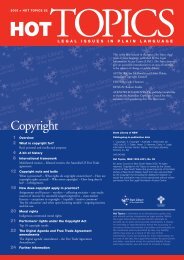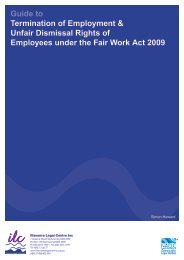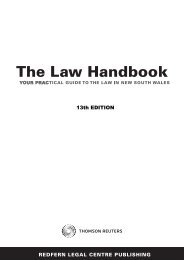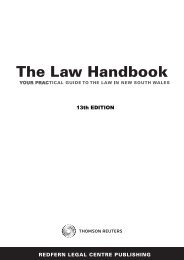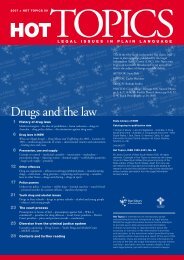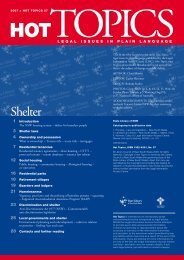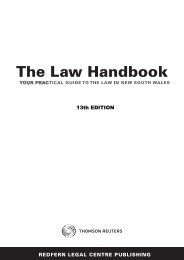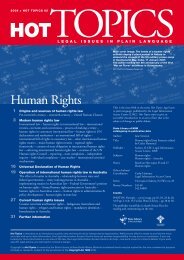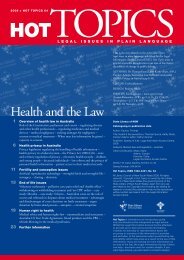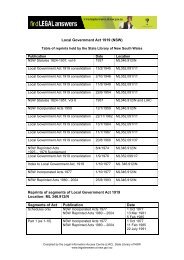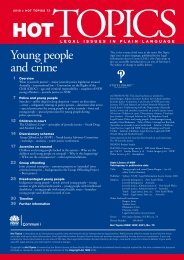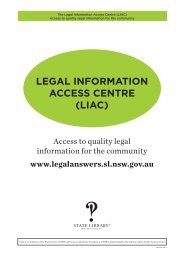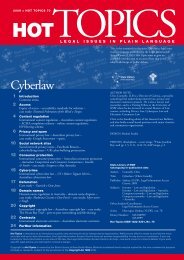Terrorism - Hot Topics 58 - Legal Information Access Centre
Terrorism - Hot Topics 58 - Legal Information Access Centre
Terrorism - Hot Topics 58 - Legal Information Access Centre
- No tags were found...
You also want an ePaper? Increase the reach of your titles
YUMPU automatically turns print PDFs into web optimized ePapers that Google loves.
ausTralian seCuriTy inTelligenCeOrganisaTiOn pOwersAmendments to the Australian Security Intelligence Act1979 (Cth) in 2003 gave ASIO (Australia’s domesticintelligence agency) new powers to question and detainpeople over 16 years in terrorism investigations. ASIOobtain the Attorney-General’s consent to apply toan ‘issuing authority’ (a federal magistrate or judgeappointed by the Attorney-General) for a warrant toquestion a person before a ‘prescribed authority’ (suchas an experienced retired judge). The warrant can beissued if there are reasonable grounds for believing thatit will ‘substantially assist the collection of intelligencethat is important in relation to a terrorism offence’.Other methods of collecting the intelligence must also beineffective. If a person is aged between 16 and 18 years, itmust also be likely that the person has, is or will commita terrorist act.A person need not be suspected of any crime orinvolvement of terrorism. It is enough that the personmay have information relevant to investigating terrorismby others. A warrant may last for 28 days, within whicha person can be questioned for up to 24 hours in total(in periods of no more than eight hours at a time). Thetotal questioning period is extended to 48 hours if aninterpreter is used. There are criminal penalties of fiveyears’ imprisonment if a person refuses to answer aquestion (even if it incriminates the person), or gives falseor misleading answers.ASIO may also apply for a warrant to detain a personfor up to seven days, based on grounds similar to thosefor questioning warrants (the duration of questioningpermitted is also the same). An additional requirementis that the Attorney-General must be satisfied that if theperson is not detained, he or she‘(i) may alert a person involved in a terrorism offencethat the offence is being investigated; or(ii) may not appear before the prescribed authority; or(iii) may destroy, damage or alter a record or thing theperson may be requested … to produce’.After a person is released, a new warrant may be issued ifnew evidence arises.Following extensive community and parliamentarydebate, amendments to the original ASIO Bill proposed in2002 made substantial improvements. These included:> raising the minimum age of detainees to 16 years andgiving special protections to minors;> allowing detainees access to a lawyer (except where thelawyer poses a security threat);> reducing the maximum questioning period to 24hours over seven days;> a three-year sunset (or expiry) clause.In addition, the process of issuing warrants and supervisingquestioning now provides essential protections. Judicialauthorisation of questioning and detention is required, asis supervision of questioning by a retired Federal or Statejudge or Administrative Appeals Tribunal member.People under warrant must be treated with humanityand with respect for their dignity, and cruel, inhumanor degrading treatment is forbidden. A Protocoldetails standards on questioning and detention andthe independent Inspector-General supervises mostquestioning sessions. The Inspector General observedthat questioning has been conducted professionally andappropriately; that subjects have been accorded dignity,respect, physical comfort and religious needs; andfacilities have been appropriate.Important concerns remain about the ASIO laws. First,the duration of detention (up to seven days) is arguablyexcessive, since non-suspects may be detained for aperiod seven times longer than the already prolongedinvestigative period for terrorist suspects (24 hours).Secondly, the availability of legal advice and representationis limited, since lawyers cannot intervene in questioningor be present when people are in detention, and maybe removed for ‘unduly disrupting’ proceedings. Whilelegal professional privilege is protected, lawyer-clientconfidentiality is not. These restrictions may prevent alawyer from adequately representing and protecting hisor her client’s interests.Thirdly, there are harsh criminal penalties of up tofive years imprisonment for disclosing ‘operationalinformation’ about ASIO interrogations within twoyears after the expiry of a warrant. This offence wouldmake it a crime to tell a police officer or a journalistabout abuses of a person in detention. It prevents publicscrutiny of the propriety of the investigative process andreduces the accountability of ASIO, particularly sincejudicial review under existing laws may be limited.Detention is the most invasive restriction on personalliberty and is usually only used as part of the criminalprocess, and not solely to gather intelligence. In ademocracy, detention should be a means of last resort, to beused after all feasible alternatives have been exhausted. IfASIO detention aims to prevent absconding, destructionof evidence, or a person alerting others that terrorismis being investigated, then those purposes can probablybe achieved by less invasive means – such as electronicmonitoring, home detention or surveillance, telephonereporting, or restrictions on visitors, computers andtelephones (consider control orders on p 23).australian anti-terrorism laws 21



